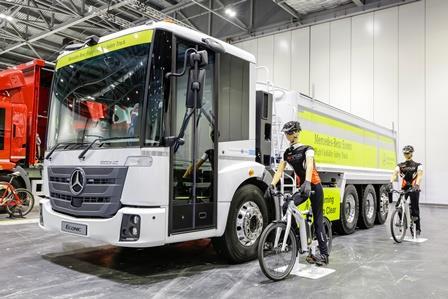
Sir Peter Hendy, commissioner at TfL, opened the fourth meeting of the Construction Logistics and Cycle Safety (Clocs) initiative with an admission: “I did not expect this activity to grow as quickly as it has.”
He added later in his keynote speech: “You all work on relatively thin margins but you’re bursting with ideas about how to make things safer.”
It wasn’t hyperbole either. Two years on from the release of the research on collisions between HGVs and vulnerable road users that underpinned the creation of Clocs, last month’s event (26 February) took up a hall at London’s Excel exhibition centre, notably filled with a display of ‘safer trucks’ from some of the major manufacturers for the first time.
“London’s growing and it will continue to do so. That’s fabulous news for the construction industry, related logistics and the logistics industry in general [supplying the city] but it is also a real challenge in regards safety,” said Sir Peter, impressing that there was no time for complacency despite the huge strides made.
He reiterated that this meant the construction and logistics industries had to do better than it was doing now in preventing vulnerable user deaths – a cyclist was killed at Victoria just last month – but he added, “I think we’re starting to do that”.

Sir Peter announced that the Industrial HGV Task Force – a joint initiative between the Metropolitan Police Force (Met), TfL and the DVSA – would continue, adding that in its first 15 months it had performed more than 4,000 targeted stops of vehicles and issued more than 1,000 fines to those running non-compliant and dangerous operations.
Sir Peter – who said there had been a marked decrease in unsafe scaffolding trucks on the capital’s roads as a consequence – made the case that tackling the non-compliant and leaving compliant operators alone was something he believed in (and a case he had more recently been making with the Association of Chief Police Officers).
As with Fors, now under the day to day running of Aecom, Sir Peter and his team are pushing Clocs as a national standard, encouraging clients to extend management of workplace risk beyond simply the gates of their site. Sir Peter has also had meetings with his opposite numbers in local government around the UK in a bid to get them to also adopt the scheme.

Fielding the often-raised question over what is being done to ensure cyclists comply with the laws of the road Sir Peter, who has a PCV licence and still occasionally drives, said he was amazed how many cyclists pass him at night without lights, dressed in black. He said Operation Safeway, which sees the police address offences among cyclists and motorists at junctions would continue and “improves behaviour each time we do it. We are fining cyclists for going through red lights”.
TfL is also continuing to support Bikeability, a modern version of the cycling proficiency test.
It was also revealed that there were now 80 Clocs champions making the case nationally (Clocs has a stronghold in London and the South East but this is rapidly changing), and that these champions had written collectively to the UK’s eight Cycle Cities (Newcastle, Leeds, Manchester, Birmingham, Cambridge, Oxford, Norwich and Bristol) to offer their expertise, as well as responding to the DfT Cycling Delivery Plan consultation.
Ultimately, TfL is agitating for the speedy introduction of improved-visibility trucks for the construction sector. It sees a future where a haulier in anything other than a low-entry cab, improved visibility truck simply won’t be allowed access to its sites.
Why we’re here
The conference ended on a sombre note with Cynthia Barlow for RoadPeace and Kate Cairns, founder of the See Me Save Me campaign, describing their experiences of losing a daughter and sister respectively in incidents involving tippers in London.
Cairns, who works as a consultant in the construction industry, said that the on-site safety culture had moved on so far in 20 years, it now needed to be brought onto the road [Clocs’ aim]. “It shouldn’t be considered to be brave cycling to work. In an age of technology, why do we send drivers out blindfolded? We need the industry’s help for quicker change,” Cairns told delegates.
This sea-change appears to be happening, with Clocs snowballing and finding ever wider acceptance nationally, and manufacturers responding with improved visibility vehicles. However, while much has been achieved it is by no ways the end of the road.
As conference chairman Brian Weatherley said in his closing speech, “there’s been four cycling fatalities this year in London all involving HGVs. It’s clear it’s not done yet”.
Keeping the wheels turning
TfL along with a consortium of 13 major operators have been using their buying power to force manufacturers to respond to the call for trucks with reduced blind spots. On the evidence of the exhibition attached to the event it’s succeeding, with 14 “safer” trucks on show compared to three last summer.

However, without the sorts of volumes the standard truck market enjoys there remains an affordability issue – one exhibitor suggested to MT that the “safer” design carried a 30% premium over the equivalent Euro-6 truck. Of course with the issue of vulnerable road user safety such a personally and politically charged one it isn’t something that operators can afford to ignore.
There were examples of Volvo’s clear driver’s door, itself a concept resurrected from Volvos of yore, and the important sight of an 8x4 Mercedes-Benz Econic-cab tipper. Confirmed as entering mainstream production at the IAA Hannover show last autumn, the vehicle matters because it represents the mainstay of the UK tipper fleet – the four axle-tipper- and promises a much better payload of 20-tonnes where there was only the 3-axle option before.
DHL’s gas-powered urban delivery Scania, revealed at MT’s Quiet Cities Conference last year, was also on show.

There was talk about moving Clocs beyond its construction heartland, and this could be seen in SIG’s new urban delivery vehicle – a direct replacement for its standard 28-tonne truck that will typically deliver products such as insulation to commercial projects in built-up areas, running from its London depot.
PEAK PROBLEMS
Sir Peter was unequivocal that a lorry ban in peak commuter hours wasn’t an option, but he said: “We have to do something about the hours that freight and logistics companies are on the road.”
TfL, which has out-of-hours research ongoing, said this need not be during the night – operating from 5pm to 9pm was suggested, as was the use of consolidation, with retailers on London’s upmarket Old Bond Street put forward as an example.
“If you find ways to expand the time window to do business [beyond the typical 7am to 1pm] it would be good to do, and good for your business.”
O’DONOVAN
O’Donovan MD Jacqueline O’Donovan told MT she welcomed the development of safer urban vehicles and is pleased, despite the slow start, with how manufacturers have stepped up to the challenge at different levels.
The operator is now trialling a selection of the ‘safer’ designs, which include a Volvo FL818 skip truck and a Daf FA LF220 skip-loader. Both vehicles have the driving position lowered and the Volvo has a glazed nearside lower door to the increase driver’s direct vision.
The business is also operating an MAN TGM BB skip-loader, with revised suspension to lower the cab, and plans to shortly trial a new Mercedes-Benz Econic skip lorry. “The Econic, with a dust cart cab and a skip back, is totally alien to us,” added O’Donovan. “But the whole purpose of this [Clocs] is a culture change, so we’re going to trial something new and give it a run.”

The firm’s 85-strong fleet has been retrofitted with around £5,000 per vehicle of additional safety equipment, however, O’Donovan is keen that manufacturers start building these features into vehicle design: “Improved design and visibility will eliminate the need for add-on safety equipment on vehicles already costing £80,000 to £100,000,” she added.
O’Donovan said training is also essential for all drivers working in city centres, with all the company’s drivers undertaking a Safe Urban Driving course, run by TfL, which includes a half-day in the classroom and a half-day on a bicycle. “A driver can’t appreciate what a cyclist is feeling unless they have done it themselves.”
She added that although a gradual process, clients’ perception of Clocs was changing and the scheme would fly once they “appreciate the importance of compliance in the procurement process”.
Additional reporting by Hayley Pink














